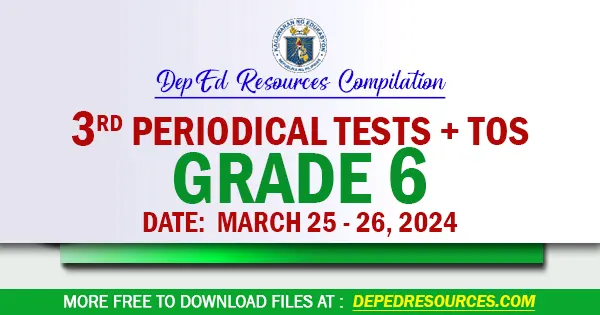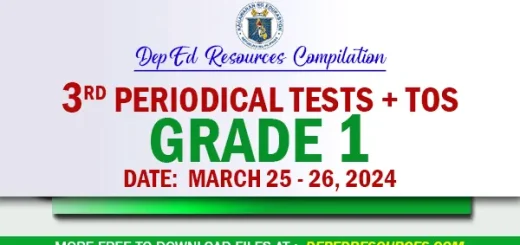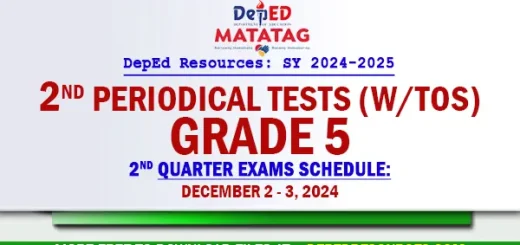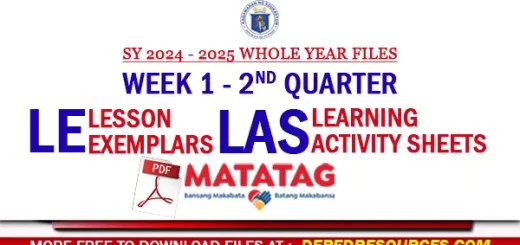Grade 6 – 3rd Periodical Tests – All Subjects + TOS | SY 2023-2024
Welcome! To help teachers make decisions about changes in instruction based on student performance, we have ready-made MELC-Based Grade 6 – 3rd Periodical Tests – All Subjects + TOS | SY 2023-2024 that are in line with the most recent Curriculum Guide for each grade level accessible for download. See Google Drive links below.
Qualitative Evaluation Techniques
New techniques for data analysis and interpretation are needed in order to evaluate and make acceptable deductions from both formal and unofficial data sources. The percentage of tasks correctly solved can no longer be used to determine a student’s status. With all of the evaluation techniques, the demand for teacher discretion and qualitative methods of research has significantly increased. The creation of scoring rubrics has been the most obvious new method for assessing complex performances and open-ended assignments.
The comparative quality of assessment items can be evaluated using a set of organized categories and related criteria provided by rubrics. Yet, for many real-time applications of instructional evaluations as well as, more generally, in classes with young children, rubrics and formalized grading schemes are inappropriate.
The compatibility of providing a numeric score and ranking performance on a continuum with cultural and constructivist approaches is also seriously questioned. It is likely true with new kinds of assessment as well, unless they play a very different function in the cultural traditions of the classroom, that testing adds to the commercialisation of learning. Such methods run the risk of eliminating or devaluing experiences that do not line up with curricular guides or checklist labels because they presuppose linkages between parts that may not be accurate.
Locally-negotiated scoring procedures and clinical or interpretive techniques to data processing should both be used in good assessment practice. The use of qualitative descriptors or explicit scoring criteria is crucial when providing feedback to students and encouraging self-evaluation. As teachers and students come to a consensus on what constitutes exceptional work, formal standards for assessing student work may become the focus of significant discussions and conflicts.
Feedback is much more helpful if the teacher or peer reviewers discuss well-known criteria on each paper, such as quality of ideas,use of evidence, historical content, and clarity of communication, and if students have lots of opportunities to make the connections between the definitions of these criteria and examples from their own work over time.
It is more advantageous to keep these informative categories distinct than than arbitrary combining them into a single holistic score. Older students, on the other hand, should be aware of how different pieces are sorted and graded if not rigorously added up because this arrangement, whether quantitative or qualitative, also contains and expresses what is crucial to know.
DepEd 3rd Quarter Examination Schedule |
DepEd 3rd Periodical Tests Schedule
March 25 – 26, 2024
(Monday – Tuesday)
How should a teacher interpret the data given from many sources, not for the purpose of a cumulative grade but rather to make decisions about instruction? Using insights to develop a working hypothesis, getting further data to confirm or change it, planning an intervention and other similar techniques are all strongly related.
Making meaning of data from observation and work samples in the classroom entails searching for patterns, vetting for inconsistencies, and comparing the evolving description to theories of gaining competence. Teachers must therefore be skilled in data triangulation and sifting techniques as well as possess a solid understanding of subject-matter theory to use when analyzing the findings. In the same way that traditional field anthropologists would, teachers look over the information they have gathered from a range of classroom literacy exercises and make an effort to categorize it.
.

Grade 6 – 3rd Periodical Tests – All Subjects + TOS |
SY 2023-2024
- GRADE 6 – 3rd Periodical Test in ARALING PANLIPUNAN 6
- GRADE 6 – 3rd Periodical Test in ENGLISH 6
- GRADE 6 – 3rd Periodical Test in EPP 6
- GRADE 6 – 3rd Periodical Test in ESP 6
- GRADE 6 – 3rd Periodical Test in FILIPINO 6
- GRADE 6 – 3rd Periodical Test in MAPEH 6
- GRADE 6 – 3rd Periodical Test in MATHEMATICS 6
- GRADE 6 – 3rd Periodical Test in SCIENCE 6
MORE FREE TO DOWNLOAD FILES HERE
Budget of Work | Bulletin Board Display | Curriculum Guide | Daily Lesson Log | DepEd Announcements | DepEd Memo | DepEd News | DepEd Official Statements | DepEd Order | DepEd Press Releases | Designs and Templates | Detailed Lesson Plan | Diagnostic Test | Download Files Here | Exams | Forms | Graduation | Instructional Materials | Latest News | Latest! | Learners Material | Periodical Tests | Powerpoint Presentations | Reviewers | RPMS | School Forms | Summative Test | Teachers Guide | Teachers Manuals | Teachers Tools | Weekly Daily Lesson Log | Workbooks
These 3rd Periodical Tests were made in compliance with the Department of Education requirements.
DepEd Resources credits these files to all the owners and authors as well as those who sent us this files for posting. We will always be thankful of you. You make DepEd Resources possible for our beloved teachers .
Please LIKE and SHARE so everyone would benefit from these files. Thank you!
LIKE US on Facebook! Click Here.
“I cannot do all the good that the world needs. But the world needs all the good that I can do.”
―















